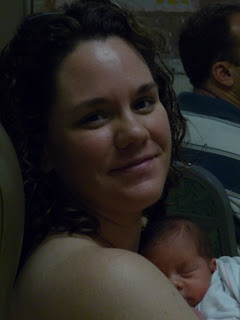As I've
mentioned in this space before, the early days with twins were rough. Really, really rough. It's easy to sit back from my vantage point of 12 months, snuggle my beautiful boys, and say, "It wasn't so bad." But it was. It was very bad.
And in an effort to share my honest experiences, and in pursuit of healing, I've decided to be brutally honest here.
When I was pregnant, I went on bed rest at 24 weeks. I began pre-term labor shortly thereafter, and visited the hospital seven times over the next ten weeks.
The first time I went to the hospital, I received shots of terbulatline, and when those didn't work, I got the mag. Magnesium sulfate is what the doctors called "the big guns" when it comes to stopping pre-term labor. Mag makes you hot, and sleepy, and confused. It also worked; the contractions stopped, and I went home. I was on oral procardia and home contraction monitoring. The next five trips to the hospital were short outpatient visits: I got more terb shots and went home. The final time I went to the hospital, the terb didn't work. The contractions kept coming. They put me on magnesium sulfate again. But it didn't work that time.
I was 3 cm dilated with a bulging sack of waters when it was decided that "Today is a birthday!" as my OB cheerfully told me. But since I'd been on major doses of mag for the past twelve hours or so, this didn't register with me as being the big deal that it truly was.
I was prepped for surgery, cut open, delivered of my babies, sewn back up, and put into recovery while I was still under the thick, sodden, grey wool blanket of mag. Gus and Jack were born at 2:07 and 2:08 pm, and whisked away to the NICU shortly afterwards. Moviedad went with them, per our birth plan. I was alone and staggering mentally under the weight of all that had just happened.
I remember waking up in the post-partum room, alone, confused, and looking at the clock. It was eight o'clock. My first thought? "Oh, I guess I won't be able to watch Lost tonight". This was apparently my brain's way of reverting to something normal.
My mom came in around 1 am, and got me set up on a pump. I was still too dazed and drugged to realize what was happening, though. It wasn't until a little before 5 am that I roused enough to have a coherent conversation. I asked to be taken to see my babies.
I didn't touch my babies until 15 hours after they were born. And I didn't hold them, I just touched their heads and stroked their arms inside the isolettes.
I am still mourning the loss of those 15 hours.
Over the next three days, I learned how to be a mama of babies in the NICU. I learned about beeps and alarms and three-hour schedules. I saw the names on the isolettes and knew those were my babies. I saw their daddy's nose on their tiny, raw faces and knew those were my babies. I was pumping my breast milk every two hours around the clock to give to my babies. But it was a very intellectual experience. My brain knew those were my babies.
But my body was achingly empty. I wanted to hold them. I wanted to cover them with claiming kisses, and inhale the pure baby-ness of their sweet skin. I wanted to count their perfect toes and marvel at their exquisite fingers in peace. I wanted them to lay on my chest, warm and nurtured, where they belonged, their heartbeats matching mine, my breath their cue. It is impossible for me to find the words to adequately express the depth of my desire to mother my newborns.
Instead, my reality was wires, and alarm tones, and swaddled bundles of babies who were too new to have coordinated their suck-swallow-breathe reflex. I knew that they were getting the best medical care possible. But I felt bereft.
I honestly believe that my body was
mourning the loss of my babies, even though my eyes and brain were telling me Gus and Jack were alive and maturing in the hospital. The impersonal
whoosh-whoosh-whooshing of the double electric hospital grade breast pump was enough to extract the life-sustaining milk, but it was not enough to convince my empty chest and grieving heart that all was well.
That was my introduction to motherhood. It's no wonder the next months were fraught with struggles.






































